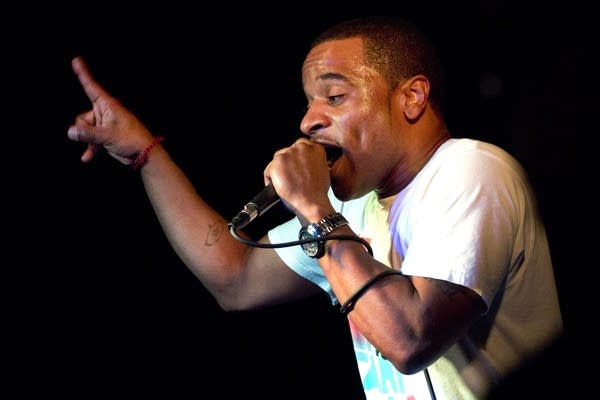Rapper Kaoz believes there's room in hip-hop for gays
Go Deeper.
Create an account or log in to save stories.
Like this?
Thanks for liking this story! We have added it to a list of your favorite stories.

When Kevin Moore steps up to the microphone as the hip-hop artist Kaoz, he "aims to speak the truth" - addressing everything from poverty to racism.
But for years the 35-year-old avoided "the whole gay thing."
Worried about how his homosexuality would play in the hyper-masculine world of hip-hop, Moore kept his own reality out of his rhymes.
"I never like actually said, 'Hey, friends, family, Romans, countrymen, I'm Kevin Moore and I'm gay. Hear me roar. I'm here. Wooo, shimmy shimmy.' None of that," he said.
Turn Up Your Support
MPR News helps you turn down the noise and build shared understanding. Turn up your support for this public resource and keep trusted journalism accessible to all.
The pretense began to wear him down. One day he decided to truly be himself, and go on stage as an openly gay rapper. He started working his experiences into his writing.
That can be difficult in hip-hop, which has never been has never been considered a supportive scene for homosexuality - perhaps because of the anti-gay lyrics of some artists or the value placed on machismo.
Moore, also a playwright, spoken word champ and HIV educator, is convinced there's plenty of room behind the mic for him and other gay rappers.

He now has to deal with those pressures along with the typical pre-performance jitters.
On the outside, Moore is covered in tribal tattoos. But he admits that his insides are all butterflies.
"I always get nervous," he said before a recent performance at Honey, a Minneapolis nightclub. "I feel everything in my stomach. I'm a Virgo so I'm very stomach-oriented person."
As he prepared to take the stage for a benefit for raise awareness of chemical dependency, the Cleveland native paced back and forth in front of the club.
Some might expect Moore's lyrics to be mirror reflections of mainstream misogyny, with men as the sexual objects instead of women. But as far as he's concerned, gay hip-hop artists often have a different mindset.
"I try to show how a man can be vulnerable and still hold on to his masculinity," Moore said. "And it's OK for you to see yourself in another person and it be a male. Some of us feel like we can't support an artist unless it's like the embodiment of what I wish I was. That's part of our internalized homophobia."
For the most part, he said, Minneapolis audiences have been accepting of his sexuality. When he's encountered resistance, it's typically been in the black community. But that, he said, is understandable.

"You're talking about a population of people who have been told, 'You're dark. You're different,'" he said.
Coming out isn't always cause for celebration.
"It's been common practice for them not to be respected," Moore said of black gays and lesbians. "They're not going to be necessarily the most adamant about ' Hey, this is me. This is who I am: respect me.'"
Moore didn't set out to be a crusader for gay rappers. But, in a way, that's what he's become. No one, he said, can represent his reality better than he can.
"I think it's kinda my duty to do it," he said. "That's the lens which I speak from. I know no other experience as much as I know that one."





